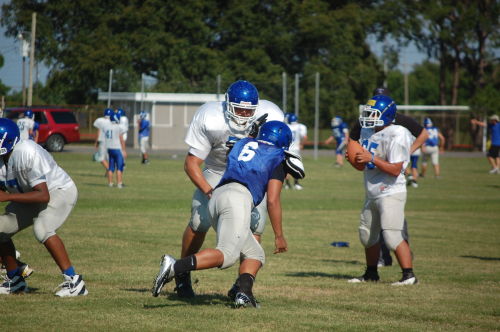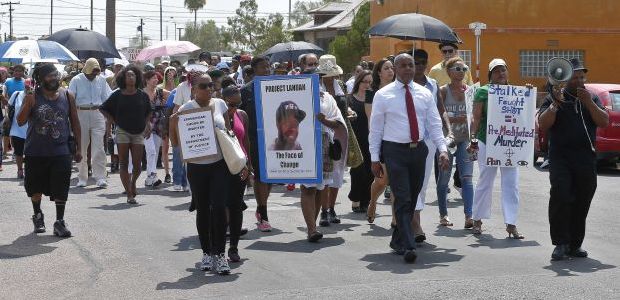
SL’s Granier gives verbal commitment to SEC’s Vanderbilt
July 23, 2013
Elementary school lease under AG’s review
July 23, 2013As the nation digests big-picture implications of the George Zimmerman murder acquittal, attorneys and law enforcement officials in Louisiana say the outcome would likely be the same here, if the case came to trial at all.
Although structured differently from Florida’s now-famous “stand your ground” law, similarities between it and Louisiana’s related statutes far outweigh any technical differences.
So in Louisiana, as in Florida, citizens have the right, whether in their homes or any place where they have a lawful right to be, to meet the threat of force with force, if they believe not doing so will result in death or serious injury.
“You have a right to defend yourself as long as you have a reasonable belief that you are fearful for your life, your kids or your family, or if anybody else is being attacked,” said Terrebonne Parish Sheriff Jerry Larpenter. “You have a right to use whatever force necessary if you fear somebody else will lose their life or suffer great bodily injury.”
Complex case
The well-chronicled Zimmerman case stems from the events of Feb. 26, 2012. Zimmerman, a neighborhood watch coordinator for a gated community in Sanford, Fla., notified police of a person he regarded as suspicious. That person, 17-year-old Trayvon Martin, had committed no crime so far as Zimmerman knew. A confrontation occurred and, according to trial testimony, a struggle ensued with Martin atop Zimmerman, leading to the firing of a fatal shot from the pistol Zimmerman was licensed to carry.
Sanford police took Zimmerman into custody but did not charge him. Subsequently state officials got involved, and a state attorney charged him with murder. An all-female, racially mixed jury acquitted Zimmerman, resulting in criticism of the justice system by civil rights advocates who said Zimmerman’s actions – beginning with the notification to police – were based solely on Martin’s race.
Burden on state
As would occur in Louisiana, it was the job of prosecutors to prove that Zimmerman did NOT act in self-defense, rather than the defense’s job to prove he did.
Although it has been touted in the national media as a “stand your ground” case, the specific Florida procedures for introducing that aspect were not introduced at trial.
That specific defense, Zimmerman’s attorneys said, was not needed because traditional aspects of self-defense were already in play, and spoke strongly enough to the issues.
In Louisiana the statutes dealing with self-defense are contained in RS 42:18-22, and make clear that a person “who is not engaged in unlawful activity and who is in a place where he or she has a right to be shall have no duty to retreat before using force or violence … and may stand his or her ground and meet force with force.”
The law goes on to say that judges or juries are not allowed to consider the possibility of retreat as a factor in determining whether the person had a “reasonable belief that force or violence was reasonable and apparently necessary to prevent a forcible offense or to prevent the unlawful entry.”
Self-defense friendly
Dane Ciolino, a professor at Loyola University School of Law who specializes in criminal law, said Louisiana limited self-defense of this nature, until some years back, to situations occurring in or at one’s home. But the law, he said, has since evolved.
“Louisiana is a very self-defense friendly state, particularly when it comes to castle invasions,” Ciolino said, referring to the old maxim about a person’s home being their castle. “When someone is trying to get in your house Louisiana allows liberal use of force against intruders.”
“Once you allege self-defense the burden is on the prosecution to prove that it doesn’t apply,” said Ciolino, who noted that in Louisiana prosecutors have far more discretion than those in other states. Louisiana’s constitution says district attorneys have ultimate discretion in deciding who and how to prosecute, and that power exists in almost all instances.
“Prosecutors have a great deal of discretion in a case of self-defense and often those cases do not get prosecuted. If a DA decides he is not bringing a case nobody can overrule that.”
Ciolino and other experts noted however that the out does not apply to a person who is an aggressor. Someone who started the trouble could not likely claim they were standing their ground. The person who was defending agaisnt that person likely could.
Local example
Self-defense was the issue in a local case last year. But it was a grand jury, rather than a prosecutor, who made the decision not to move forward with charges against 21-year-old Byron Thomas of Raceland.
Thomas fired a shot into am SUV containing young men who had attacked Thomas on the street.
According to law enforcement officials familiar with the case Thomas, believed to have possibly been a member of a rival gang drew a gun after the youths confronted him on the street.
A bullet fired at the SUV entered the vehicle and struck 15-year-old Jamonta Miles in the head, killing him.
Miles did not engage in the perceived attack on Thomas. But detectives theorized Thomas had fired to prevent the SUV and its occupants, whom he believed to have been armed, from returning to his location.
Although flares and other items were recovered from the SUV, a gun was never found.
Thomas was not arrested. But Lafourche Parish District Attorney Camille Morvant II presented testimony and evidence to a grand jury, which decided not to indict Thomas.
Thomas later pleaded guilty to a weapons charge, following his confession that the gun he used was stolen. He was sentenced to a year in jail.
In Terrebonne, Larpenter said he has handled cases where self-defense was claimed but death had not resulted, and certainly nothing with as complex a fact pattern as the Zimmerman trial.
“I don’t remember us challenging someone on a stand-your-ground,” Larpenter said. “As for self-defense I have seen a few but not to the point where there was a killing.”
Florida criticized
Critics of “stand your ground” laws say they allow far too much leeway for the shooter to claim self-defense even when the facts may not warrant so.
A license to kill ensues, critics maintain, because the standard is so subjective.
But local law enforcement officials appear to disagree. Attempts to dismantle Louisiana’s stand your ground law, if they emerge, could face an uphill battle.
Larpenter’s observation of the Zimmerman case resulted in an overall indictment of Florida practices.
“I think people are getting carried away as far as that trial in Florida goes,” he said. “You want to do a fair investigation and you don’t have to rush to make an arrest. In Florida for whatever reason they don’t know how to count votes and don’t know how to work with their district attorney. In all-out major cases the District Attorney is right there with us; you want to make a decision on charging at the same time.”
Bud Barnes, a Terrebonne assistant district attorney, said the Louisiana’s concept is fairly simple and defensible.
“If you are walking down the street someone comes at you and you reasonably believe you are in danger of harm or death, you are not required to run away,” Barnes said. “You have a right to stand your ground and protect yourself.”
Barnes acknowledged, however, that the facts are not always quite that easy to discern.
That’s why local firearms instructors say they are very careful to explain the law’s nuances to their students.
Sgt. David Robichaux of the Lafourche Parish Sheriff’s Office includes a detailed examination of Louisiana’s self-defense doctrine in the carry-permit classes he teaches to civilians, while including similar aspects of the law when teaching police officers seeking state certification.
The use of self-defense is justified for an immediate threat, Robichaux teaches. It is not predicated on the potential that someone might come back next week and try to commit a crime.
“You have to be in imminent danger, right now,” he said.
People walk in a community march for justice for Trayvon Martin, Monday in Phoenix. Dozens of people participated in a protest march, calling for federal civil rights charges to be filed against Florida neighborhood watch activist George Zimmerman. A Florida jury acquitted Zimmerman in the shooting death of Martin.














